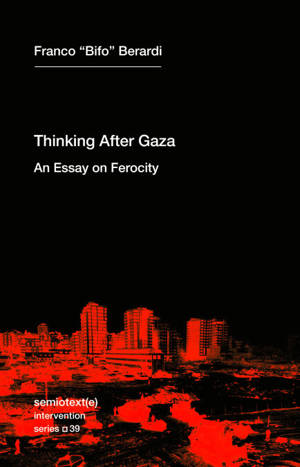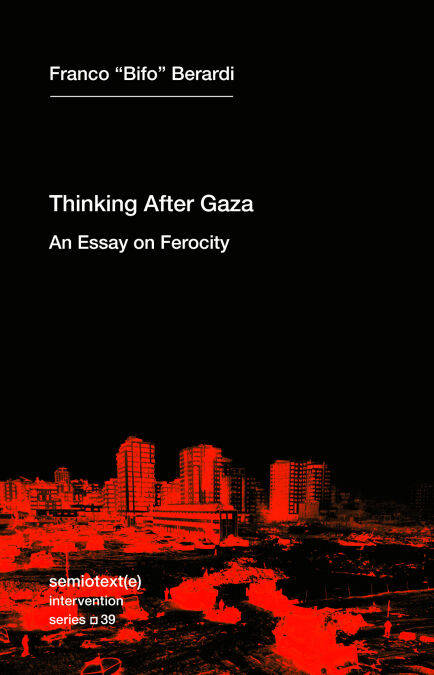
- Afhalen na 1 uur in een winkel met voorraad
- Gratis thuislevering in België vanaf € 30
- Ruim aanbod met 7 miljoen producten
- Afhalen na 1 uur in een winkel met voorraad
- Gratis thuislevering in België vanaf € 30
- Ruim aanbod met 7 miljoen producten
Omschrijving
A call to imagine a less deadly future, written in the shadow of genocide and “ferocious optimism.”
After Gaza, it is time to recognize that the attempt to humanize history has failed, and that there will not be a second try. It is time to recognize that the experiment called “civilization” has failed… The abyss is wide open and we cannot help but see it. We must gaze into the abyss, we must gauge the breadth and depth of the abyss. We must draw a map of the abyss, while precipitously falling into it.
“Thinking after Gaza” means recognizing the collapse of universal reason and democracy, the humanistic values that were the famed—and fragile—promise of modernity. But it also means searching for ways to escape the grim future awaiting those born in this disenchanted century: this century that promises to be the last, in which thought has lost all political power and the survival instinct struggles to withstand the ferocity of techno-military extermination machines. To the generation born in the twilight of Western civilization, we owe this last act of thinking, so as to imagine the desertion of our barbaric present, along pathways that have yet to be illuminated.
The latest essay by renowned Italian autonomist theorist Franco “Bifo” Berardi, Thinking After Gaza is a reflection on the multivalent consequences—political, philosophical, civilizational—of the current genocide in Gaza and the West Bank. Bearing sober witness to the conditions on the ground in the Occupied Territories, while tracking the “ferocious optimism” that has replaced Enlightenment ideals, this book is addressed not only to activists but also to pacifist philosophers, historians, and theologians.
After Gaza, it is time to recognize that the attempt to humanize history has failed, and that there will not be a second try. It is time to recognize that the experiment called “civilization” has failed… The abyss is wide open and we cannot help but see it. We must gaze into the abyss, we must gauge the breadth and depth of the abyss. We must draw a map of the abyss, while precipitously falling into it.
“Thinking after Gaza” means recognizing the collapse of universal reason and democracy, the humanistic values that were the famed—and fragile—promise of modernity. But it also means searching for ways to escape the grim future awaiting those born in this disenchanted century: this century that promises to be the last, in which thought has lost all political power and the survival instinct struggles to withstand the ferocity of techno-military extermination machines. To the generation born in the twilight of Western civilization, we owe this last act of thinking, so as to imagine the desertion of our barbaric present, along pathways that have yet to be illuminated.
The latest essay by renowned Italian autonomist theorist Franco “Bifo” Berardi, Thinking After Gaza is a reflection on the multivalent consequences—political, philosophical, civilizational—of the current genocide in Gaza and the West Bank. Bearing sober witness to the conditions on the ground in the Occupied Territories, while tracking the “ferocious optimism” that has replaced Enlightenment ideals, this book is addressed not only to activists but also to pacifist philosophers, historians, and theologians.
Specificaties
Betrokkenen
- Auteur(s):
- Uitgeverij:
Inhoud
- Aantal bladzijden:
- 176
- Taal:
- Engels
- Reeks:
Eigenschappen
- Productcode (EAN):
- 9781635902778
- Verschijningsdatum:
- 2/03/2026
- Uitvoering:
- E-book
- Beveiligd met:
- Adobe DRM
- Formaat:
- ePub

Alleen bij Standaard Boekhandel
+ 16 punten op je klantenkaart van Standaard Boekhandel
Beoordelingen
We publiceren alleen reviews die voldoen aan de voorwaarden voor reviews. Bekijk onze voorwaarden voor reviews.










